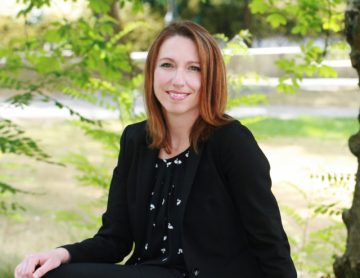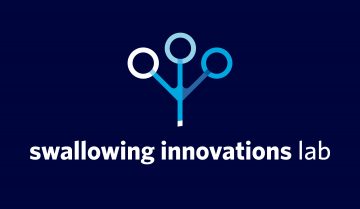 Associate Professor
Associate Professor
B.Sc (University of Alberta)
M.S. (University of Wisconsin)
Ph.D. (University of Toronto)
Contact
Phone: (604) 822-5482
Email: sskoretz@audiospeech.ubc.ca
Laboratory website: swallowinginnovationslab.com
Dr. Skoretz is an Associate Professor at the University of British Columbia (UBC), Director at the Swallowing Innovations Lab (Si-Lab) at UBC, and medical Speech-Language Pathologist. She is also an Assistant Clinical Professor with the Department of Critical Care Medicine at the University of Alberta and Associate Member with the Centre for Heart Lung Innovation at St. Paul’s Hospital/UBC. Her research affiliations include Providence Health, Fraser Health, and Vancouver Coastal Health Authorities. Utilizing a clinical-research framework, Dr. Skoretz aims to improve health outcomes for people with dysphagia through evidence-based assessment and management.
At Si-Lab, Dr. Skoretz has an active and diverse research program spanning multiple centres across two Canadian provinces and internationally. It is best described in three streams: 1) Discovery: primary research in: a) upper aerodigestive tract comparative anatomy and physiology and, b) critical illness, specifically, investigating the multi-system integration during swallowing following artificial airway use and/or non-invasive ventilation; 2) Knowledge Translation: systematic evidence synthesis to guide clinical practice in the area of swallowing and its disorders as well as the creation of cross-species conceptual frameworks of feeding and swallowing rehabilitation; and 3) Education: the development and evaluation of novel pedagogy and educational tools for skill and competency acquisition in swallowing. Her research is funded by provincial and national grants.
Dr. Skoretz has received numerous awards for her work including the Michael Smith Foundation for Health Research Scholar Award in 2020. This 5-year, highly competitive salary award is designed to support exceptional early career BC-based health researchers. Specific to COVID-19, Dr. Skoretz has also taken a leading role with international initiatives in order to help guide global practice in the area of swallowing assessment and management in acute care during the pandemic. Her work has been cited by the World Health Organization as well as has been used for multi-disciplinary practice guideline development internationally for the management of dysphagia following critical illness.
In addition to conducting research across British Columbia, Alberta, and beyond, she teaches graduate-level courses in the areas of swallowing and motor speech at UBC-Vancouver.
-
- Spronk, P.E., Spronk, L., Egerod, I., McGaughey, J., McRae, J., Rose, L., Brodsky, M.B., & DICE study investigators (2022). Dysphagia in Intensive Care Evaluation (DICE): An international cross-sectional survey. Dysphagia, 10.1007/s00455-021-10389-y. Advance online publication. https://doi.org/10.1007/s00455-021-10389-y
- Freeman-Sanderson, A., Ward, E.C., Miles, A., de Pedro Netto, I., Duncan, S., Inamoto, Y., McRae, J., Pillay, N., Skoretz, S.A., Walshe, M., Brodsky M.B., on behalf of the COVID-19 SLP Global Group. (2021). A consensus statement for the management and rehabilitation of communication and swallowing function in the ICU: A global response to COVID-19, Archives of Physical Medicine and Rehabilitation, 102(5):835-842. https://doi.org/10.1016/j.apmr.2020.10.113
- Adams, A., Vogl, W., Dawson, C., Raverty, S., Haulena, M., & Skoretz, S.A. (2020). Laryngeal and soft palate valving in the harbour seal (Phoca vitulina), Journal of Experimental Biology, 233(Pt 20). https://doi.org/10.1242/jeb.230201
- Dawson, C., Riopelle, S.J., & Skoretz, S.A. (2020). Translating dysphagia evidence into practice while avoiding pitfalls: Assessing bias risk in tracheostomy literature. Dysphagia, 36(3):409-418. https://doi.org/10.1007/s00455-020-10151-w
- Letawsky, V.H., Schreiber, A.M., & Skoretz, S.A. (2020). A tutorial on the role of saliva in swallowing with a focus on Sjogren’s syndrome, American Journal of Speech-language Pathology, 29(3): 1307-1391. https://pubs.asha.org/doi/10.1044/2020_AJSLP-19-00083
- Schreiber, A.M., Dawson, C., & Skoretz, S.A. (2020). Late dysphagia following radiotherapy after nasopharyngeal carcinoma: A case series. American Journal of Speech-language Pathology, 29(1): 319-326. https://doi.org/10.1044/2019_AJSLP-19-0116
- Skoretz, S.A., Anger, N., Wellman, L., Takai, O., & Empey, A. (2020). A systematic review of tracheostomy modifications on swallowing in adults. Dysphagia, 35(6): 935-947. https://doi.org/10.1007/s00455-020-10115-0
- Skoretz, S.A., Riopelle, S.J., Wellman, L, & Dawson, C. (2020). Investigating swallowing and tracheostomy following critical illness: A scoping review, Critical Care Medicine, 48(2): e141-e151. https://doi.org/10.1097/CCM.0000000000004098
- Vergara, J., Skoretz, S.A., Brodsky, M.B., Miles, A., Langmore, S.E., Wallace, S., Seedat, J., Starmer, H.M., Bolton, L., Clavé, P., Vaz Freitas, S., Bogaardt, H., Matsuo, K., Madeira de Souza, C., & Figueiredo Mourão, L. (2020). Assessment, diagnosis and treatment of dysphagia in patients infected with SARS-CoV-2: A review of the literature and international guidelines, American Journal of Speech Language Pathology, 29(4): 2242-2253. https://doi.org/10.1044/2020_AJSLP-20-00163
- Vergara, J., Starmer, H.M., Wallace, S., Bolton, L., Seedat, J., de Souza, C.M., Freitas, S.V., & Skoretz, S.A. (2020). Swallowing and communication management of tracheostomy and laryngectomy in the context of COVID-19: A review. JAMA Otolaryngol Head Neck Surgery, 147(1):85–90. https://doi.org/10.1001/jamaoto.2020.3720
- Skoretz, S.A., Yau, T.M, Granton, J.T., & Martino, R. (2017). The feasibility of assessing swallowing physiology following prolonged intubation after cardiovascular surgery. BMC Pilot and Feasibility Studies, 3(62). https://doi.org/10.1186/s40814-017-0199
- Coghlan, K. & Skoretz, S.A. (2017). Breathing and swallowing with high flow oxygen therapy. SIG 13 ASHA Perspectives on Swallowing and Swallowing Disorders, 2(3):74-81. https://doi.org/10.1044/persp2.SIG13.74
- Skoretz, S.A., Yau, T.M, Ivanov, J., Granton, J.T., & Martino, R. (2014). Dysphagia and associated risk factors following extubation in cardiovascular surgical patients, Dysphagia, 29(6):647-654. https://doi.org/10.1007/s00455-014-9555-4
- Skoretz, S.A., Flowers, H.L. & Martino, R. (2010). The incidence of dysphagia following endotracheal intubation: A systematic review, Chest, 137:665-673. https://doi.org/10.1378/chest.09-1823
AUDI 527 – Introduction to Dysphagia:
Key learning areas include identification of anatomical, physiological and neural controls involved in normal swallowing; biomechanics of the swallowing system, various etiologies and pathophysiological processes which underlie and/or contribute to dysphagia.
AUDI 577 – Advanced Studies in Acquired Speech and Swallowing Disorders:
Key learning areas include: principles, techniques, evidence-based and multidisciplinary approaches to the assessment and management of acquired speech and swallowing disorders across ages and settings; overview of key components for disorder specific report writing and management program creation. This course offers an introduction to diagnostic and rehabilitative instrumentation; non-oral feeding and includes discussion of ethical issues and palliative care practices. This course focuses on enhancing student knowledge/skills in the assessment/differential diagnosis and management of acquired speech and swallowing disorders.
AUDI 524 – Disorders of Speech Production:
Key learning areas include: normal and abnormal speech production in adults; motor learning principles; physiological systems associated with normal speech production and acquired speech disorders; various etiologies and pathophysiological processes which underlie and/or contribute to acquired speech disorders. This course offers students the opportunity to practice emerging skills in the differential diagnoses of motor speech disorders.
AUDI 660C – Seminar in Hearing Science:
Key learning areas include: knowledge synthesis in healthcare with a focus on dysphagia; methodology for metaanalyses, systematic reviews, and scoping reviews; statistical methodology for metaanalyses including heterogeneity assessment, quality assessment including ROBINS-I, Risk of Bias and AMSTAR This course offers students to learn knowledge synthesis study design, quality assessment methods, design and execute a stand-alone knowledge synthesis research study.
ISCI 448 – Directed Studies, Integrated Sciences
2018: Determining the feasibility of using Python for abstract screening during knowledge synthesis projects
Key learning areas: principles, techniques, evidence-based methodology in knowledge syntheses; overview of key components for research methodology and statistics; general text mining programming. Students will: enhance their knowledge/skills in coding Python; build data interpretation skills, enhance emerging manuscript writing skills.
2019: Determining microanatomy for the upper aerodigestive tract of Phoca vitulina:
Key learning areas: histology, gross anatomical structures and measurements for Phoca vitulina (harbour seal) upper aerodigestive tract. Students will: will focus on the histology of the tongue, epiglottis, larynx, pharynx and the esophagus while studying the characteristics of the mucosa, connective tissue, and muscular striations of each structure; build data interpretation skills, enhance emerging manuscript writing skills.
Jones, A.M. (2021, February 22). The speech pathologists helping COVID-19 patients learn how to swallow and speak again. CTV News. https://www.ctvnews.ca/mobile/health/the-speech-pathologists-helping-covid-19-patients-learn-how-to-swallow-and-speak-again-1.5319446
Sharratt, A. (2020, September 21). Could you have a swallowing disorder? Readers Digest Best Health.
Blackadar K. (2018, August 20). Swallowing disorder training at UBC gets a boost from simulation technology. The University of British Columbia Faculty of Medicine. https://www.med.ubc.ca/news/swallowing-disorder-training-at-ubc-gets-a-boost-from-simulation-technology/
Ho, K. (2018, October 18). Speech-language pathology simulator provides unique educational opportunities. The Ubyssey. https://www.ubyssey.ca/science/speech-pathology-simulator/
Stirling, A. (2021, Feb 24). Many covid patients need to relearn how to speak and swallow after going on a ventilator [Radio broadcast]. IHeartRADIO CFAX 1070. https://www.iheartradio.ca/cfax-1070/audio/many-covid-patients-need-to-relearn-how-to-speak-and-swallow-after-going-on-a-ventilator-1.14648300?mode=Article
